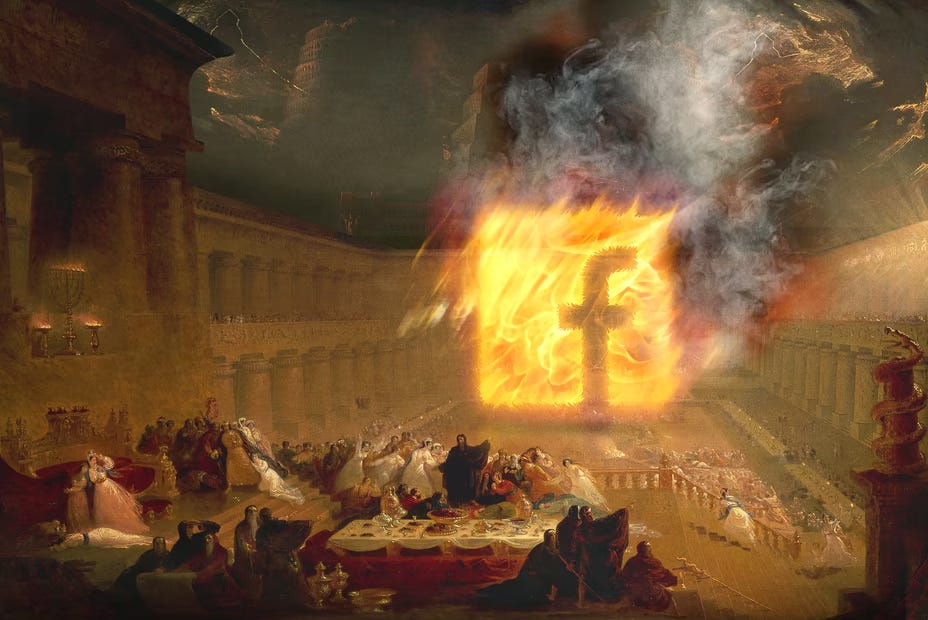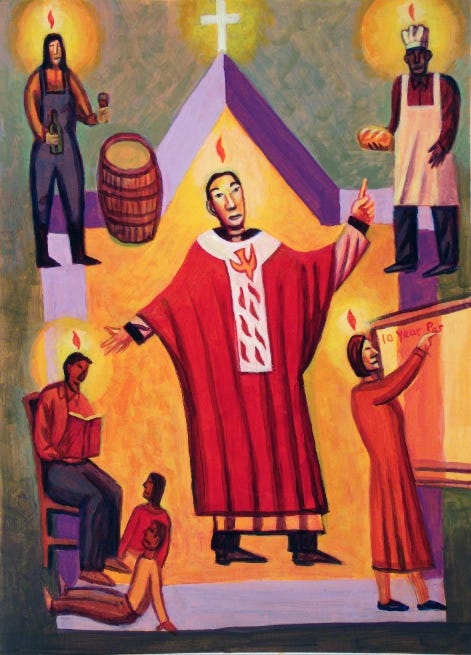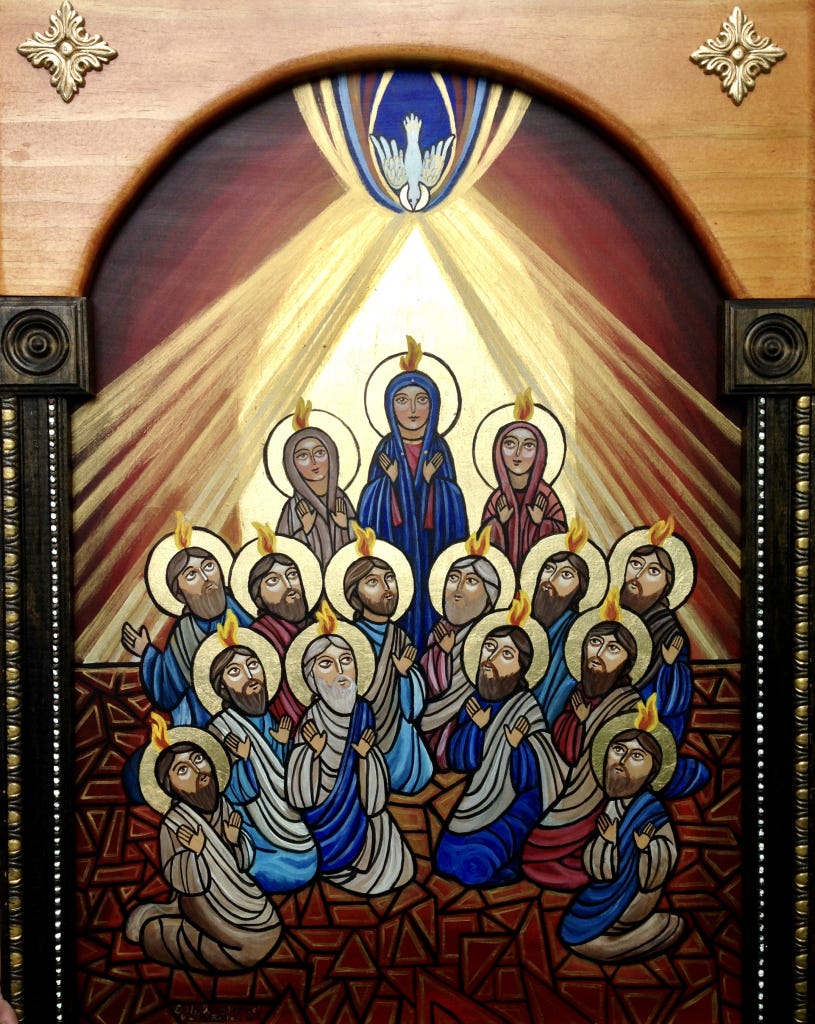Pentecost After Babel
God takes the most fragmented parts of our modern “post-Babel” lives and makes them whole.
In a May 2022 article in The Atlantic titled “After Babel,” author Jonathan Haidt details how, since 2011, we have been living in a “post-Babel era.”[i]
If you are unfamiliar with the original story of Babel and the namesake tower, here’s what you need to know. First, open your Bible (print or smartphone) to Genesis, chapter eleven.
The Book of Genesis records the Tower of Babel after God instructed Noah and his descendants after the flood waters had dried up: “Be fertile, multiply, and fill the earth; be fertile and multiply.”[ii]
Instead of inhabiting all the earth, the descendants of Noah settled in the area that we know to be Bagdad.
Instead of inhabiting all the earth and speaking many languages, the descendants of Noah shared a common language. They then attempted to build a tower that they might ascend to God.
Instead of scattering and sharing the covenant established by God with Noah, Babel took shape with its residents and attempted to reach up to God. Reaching up and not out.
“All people on the earth had one language and the same words. When they traveled east, they found a valley in the land of Shinar and settled there. They said, “Come, let’s make bricks and bake them hard.” They used bricks for stones and asphalt for mortar. They said, “Come, let’s build for ourselves a city and a tower with its top in the sky, and let’s make a name for ourselves so that we won’t be dispersed over all the earth.”[iii]
Haidt argues that the story of Babel is not about tribalism. Instead, he writes Babel is “a story about the fragmentation of everything.”
Anyone with a Facebook or Twitter account will affirm Haidt’s hypothesis. Social media platforms morphed from the place where we share updates about our lives and pictures of cats to a space where users are more adept at performing and managing their social brand than they are at connecting with family, old friends, or strangers. While there may be three billion users worldwide, we often speak and listen to only one of a handful of “languages” or ideologies.
Haidt contends the lead-up to the 2016 election cycle was the catalyst that cemented our fragmentation, entrenching us into ideological groups that cannot listen to one another or acknowledge our shared history or values. It’s not that we are choosing not to listen to one another. Instead, it’s that we are no longer able to do so. Just as the Lord came down in Genesis 11 to, “confuse”[iv] the language of the citizens in Babel.”
The Lord came down to see the city and the tower, which mortals had built. And the Lord said, “Look, they are one people, and they have all one language; and this is only the beginning of what they will do; nothing that they propose to do will now be impossible for them. Come, let us go down, and confuse their language there, so that they will not understand one another’s speech.”[v] What had the people of Babel planned to do? “To make a name for” themselves “so that we won’t be dispersed over all the earth.”[vi]
The past month of headlines has proven Haidt’s point that we no longer understand “one another’s speech.”[vii] Between the debates over abortion and gun violence in our nation, amid conversations about what it means to be “pro-life,” we are talking past one another at best. We have moved beyond debate to siloed echo chambers. This has set the stage, Haidt argues, for the modern post-Babel scattering we are experiencing today. A place where “nothing really means anything anymore – at least in a way that is durable and on which people widely agree.”
You are probably wondering what this has to do with our scripture reading. No, we did not read the wrong passage. Today is Pentecost, and we correctly read the Book of Acts account of Pentecost. Let’s begin to connect the dots and see where we end up.
“When Pentecost Day arrived, they were all together in one place.”[viii]
“They” were all gathered in Jerusalem for a festival where Israel remembers the gift of the Law to their ancestors. A moment on Mount Saini, where wind rushed, and a bush was engulfed in flames but not consumed by the fire.
“Jews from every nation (the nations that are difficult to pronounce)” were in Jerusalem. This is a reminder that after Babel, God scattered the people. While they held the Law in common, they spoke their own languages. They had their own customs. They had their own interpretations of the Law. They lived fragmented lives because of being sent in every direction from Babel.
All these people, representing all the known world, heard the followers of Jesus speaking “mighty works of God”[ix] in their own languages.
At Pentecost, through the power of the Holy Spirit, the Advocate the disciples had been waiting for, and the proclamation of the Gospel, God reversed the scattering of Babel and continues the work of defragmenting the compartmentalized lives of all humanity. Through Jesus Christ, the Apostle Paul writes, “There is neither Jew nor Greek; there is neither slave nor free; nor is there male and female, for you are all one in Christ Jesus.”[x]
All the nations represented at Pentecost are one because of the “mighty works of God;” because of the faithfulness of Jesus Christ.
Just as God reached down in Genesis, at Pentecost, God continues the work of reaching down to humanity. Reaching down, reaching to us, is a hallmark of Jesus’ ministry.
Jonathan Haidt asks, “what would it be like to live in Babel after its destruction?”
Confusion, loss, and despair in the acknowledgment and loss of what could have been. But in the Church, we hold onto the promise that God is at work amid confusion, loss, and despair. We do not have to search or reach up to the heavens hoping that we might find the Messiah because God is continually reaching down to us. Through the life, death, and resurrection of Jesus Christ, we have been freed from being our own saviors. Being their own savior is one of the things that got the citizens of ancient Babel in trouble.
God takes the most fragmented parts of our modern “post-Babel” lives and makes them whole. This is part of God making all of creation whole. We bear witness to this when we gather around Christ’s table. This is our witness in our worship, mission, and teaching. The unification of the Church is the work of the Holy Spirit – bringing people who speak different languages or only listen to siloed voices together to speak the one language of the Holy Spirit, the one language of God. The language of Grace.
You probably think this does not leave much for us to do. And you’re right. We are free from having to do anything to earn favor with God. That is the good news of the Gospel.
If we can learn anything from Babel and our modern post-Babel era, it is that doing too much is often the way we opt to ignore the work God has already done and is continuing to do.
But if you absolutely need something to do, let’s look to the advice of Dr. Jack Levison, Professor of Old Testament Interpretation and Biblical Hebrew at Perkins School of Theology, and look to the first disciples who stayed put and waited.[xi]
After the Ascension of Jesus, the disciples went back to Jerusalem, where they waited. Jesus had only told the disciples to wait. Still, the disciples had spent enough time with Jesus to know that staying and waiting meant praying. If you need something to do, pray.
The Pentecost outburst was a proclamation of God’s deeds, i.e., what God had done in Jesus and what God had done throughout the history of Israel, so if you need something else to “do,” study those deeds.
Do not be caught by surprise. The first disciples waited, prayed, studied, and expected.
At Pentecost, God reached down and began the work of forming the Church. The Church is the body of Christ, the vessel through which God has promised to work to bring the Kingdom of God to full reality. And while it may seem that the Church is more fractured than ever, more scattered from one another than ever before, we know that it is the work of Christ, through the power of the Holy Spirit, that God will continue to reach to humanity, despite our desire to turn away from God and one another.
[i] https://www.theatlantic.com/magazine/archive/2022/05/social-media-democracy-trust-babel/629369/
[ii] Genesis 9:1, CEB
[iii] Genesis 11:1-4, CEB
[iv] Genesis 11:7, NRSV
[v] Genesis 11:5-7, NRSV
[vi] Genesis 11:1-4, CEB
[vii] Ibid.
[viii] Acts 2:1. CEB
[ix] Acts 2:11, CEB
[x] Galatians 3:28, CEB
[xi] https://www.patheos.com/blogs/spiritchatter/2013/05/pentecost-for-the-rest-of-us/









